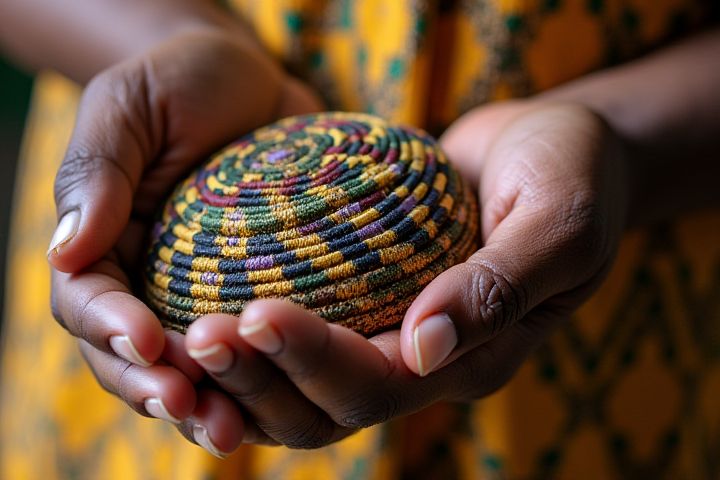
Nigeria boasts a rich tapestry of traditional crafts that reflect its diverse cultures and histories. Artisans skillfully create intricate beadwork, using materials like seeds and stones to design beautiful jewelry that often holds cultural significance. Traditional textiles, such as the vibrant Aso Oke, are handwoven by skilled weavers, showcasing unique patterns that represent various ethnic groups. Pottery, particularly from the Nok culture, highlights ancient techniques still used today, producing functional and artistic pieces. You can explore these traditional crafts at local markets, where artisans proudly display their heritage through handmade goods.
Yoruba Adire textile dyeing
Yoruba Adire textile dyeing is a vibrant traditional craft in Nigeria, renowned for its intricate patterns and rich cultural heritage. This unique technique involves resist dyeing on cotton fabric, often using indigo dye to create stunning blue and white designs that tell stories of the Yoruba people's history and beliefs. Artisans employ various methods, such as tying, stitching, and wax-resist, resulting in distinct visual aesthetics for each piece. When wearing Adire, you not only embrace a beautiful fabric but also celebrate the craftsmanship and cultural significance rooted in Nigeria's artistic traditions.
Igbo Uli body art
Igbo Uli body art represents a significant aspect of Nigeria's traditional crafts, showcasing intricate designs and vibrant colors that hold cultural meaning. This art form typically involves temporary tattoos applied to the skin using natural dyes, often during important ceremonies and festivals. The designs are deeply symbolic, reflecting themes such as fertility, beauty, and ancestral heritage, which foster a sense of identity within the Igbo community. By exploring Uli body art, you gain insight into the rich traditions and artistic expressions that continue to thrive in Nigeria's diverse cultural landscape.
Hausa leatherwork
Hausa leatherwork, a traditional craft in Nigeria, showcases intricate designs and exceptional craftsmanship. Artisans utilize locally sourced animal hides, predominantly cow and goat skins, to create durable products such as bags, shoes, and traditional garments. The use of natural dyes, often derived from plants, gives each piece a unique character and vibrancy. By preserving these traditional techniques, the Hausa community not only maintains cultural heritage but also contributes to the local economy through skilled craftsmanship.
Nupe glassmaking
Nupe glassmaking is a traditional craft in Nigeria renowned for its intricate designs and vibrant colors. This art form, passed down through generations, utilizes locally sourced materials, showcasing the rich cultural heritage of the Nupe people. Skilled artisans employ methods that blend age-old techniques with contemporary aesthetics, creating unique glass items that are both functional and ornamental. Engaging with this craft not only supports the local economy but also enriches your appreciation for Nigeria's diverse artistic traditions.
Tiv A'nger weaving
Tiv A'nger weaving is a vibrant traditional craft rooted in Nigeria's rich cultural heritage, particularly among the Tiv people. This intricate textile art involves using local materials such as cotton and dyes derived from natural sources, showcasing the craftsmen's skills and creativity. The resulting woven fabrics often feature bold patterns and colors, reflecting the community's history and values. Engaging with Tiv A'nger weaving not only supports local artisans but also preserves an essential aspect of Nigeria's diverse cultural landscape.
Itsekiri bronze casting
Itsekiri bronze casting is a revered traditional craft in Nigeria, showcasing the rich cultural heritage of the Itsekiri people. This intricate art form involves a meticulous lost-wax process, where artisans create detailed sculptures and ceremonial artifacts that reflect both historical significance and artistic expression. You can find these bronze works often depicted in religious and royal contexts, serving as symbols of power and spirituality. The preservation of this craft not only highlights the skills of Itsekiri artisans but also plays a vital role in the promotion of Nigeria's diverse cultural landscape.
Fulani calabash carving
Fulani calabash carving is a traditional craft in Nigeria, showcasing the rich cultural heritage of the Fulani people, who are primarily known for their pastoral lifestyle. These intricately designed calabashes, often used for storage, cooking, and ceremonial purposes, are handcrafted from gourds, demonstrating remarkable skill and attention to detail. Artisans use various techniques, including painting and etching, to embellish these calabashes with symbols and patterns that hold significant cultural meaning. Supporting this craft not only preserves an important aspect of Nigerian identity but also promotes sustainable practices by utilizing natural materials.
Benin brass sculptures
Benin brass sculptures represent a significant aspect of traditional crafts in Nigeria, showcasing the rich artistic heritage of the Benin Kingdom. These intricate pieces, often crafted using the lost-wax casting technique, depict historical figures, deities, and commemorative scenes, reflecting the culture and history of the Edo people. The brass work not only serves as a decorative art form but also plays an essential role in ceremonies, rituals, and the preservation of ancestral lineage. Your appreciation of these artworks can deepen your understanding of Nigeria's diverse cultural landscape and the historical significance embedded within these timeless creations.
Ebira beadwork
Ebira beadwork, a prominent aspect of traditional crafts in Nigeria, showcases the rich cultural heritage of the Ebira people in Kogi State. This intricate art form utilizes colorful glass beads to create exquisite jewelry, ornamental pieces, and ceremonial attire, reflecting the craftsmanship passed down through generations. The beadwork often holds significant meaning, symbolizing social status, marital eligibility, and cultural identity, making it an essential element of community life. By engaging with this vibrant craft, you can gain a deeper appreciation for Nigeria's diverse artistic expressions and the stories woven into each exquisite piece.
Kanuri pottery making
Kanuri pottery making is a significant aspect of traditional crafts in Nigeria, showcasing the rich cultural heritage of the Kanuri people in the northeastern region. Skilled artisans create intricate pottery pieces, often used for both functional and decorative purposes, utilizing age-old techniques passed down through generations. The distinctive styles and patterns reflect the community's identity and are often inspired by local customs and natural surroundings. Engaging with this craft not only preserves the artistic traditions of Nigeria but also empowers local economies through the promotion of handmade goods.
